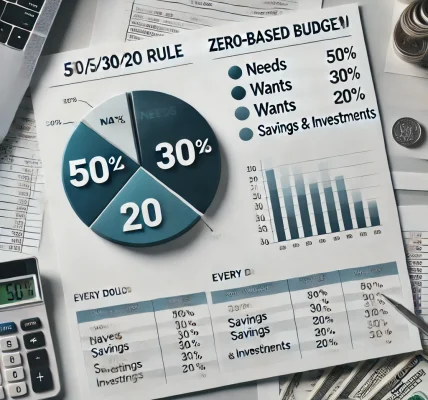Life is full of exciting milestones, but these big events often come with hefty price tags. Whether you’re planning a wedding, preparing for a dream vacation, or celebrating a milestone birthday, it’s essential to budget wisely. Big life events require thoughtful financial planning to avoid overspending and ensure you can enjoy the moment without financial stress.
In this blog, we’ll dive into how you can create a budget for major life events and make the most of your special moments without breaking the bank.
Why Budgeting for Big Life Events is Important
Big life events like weddings, vacations, and celebrations are once-in-a-lifetime experiences (or at least, they feel that way!). While it’s easy to get swept up in the excitement, failing to budget for these events can leave you with a pile of debt or financial regret. Here’s why budgeting is crucial:
- Avoiding Debt: Without a clear budget, it’s easy to overspend and rely on credit cards, leading to unnecessary debt.
- Maximizing Your Savings: By setting a realistic budget, you ensure you’re able to allocate funds to all areas of the event without sacrificing quality or missing any important details.
- Peace of Mind: Knowing you’ve planned your finances properly gives you peace of mind, allowing you to enjoy the event without worrying about the aftermath.
Step-by-Step Guide to Budgeting for Big Life Events
1. Start with a Clear Vision
Before diving into the numbers, it’s important to get clear on what you want from the event. What are your priorities? Do you envision a lavish wedding, or are you more focused on a budget-friendly honeymoon? Are you looking for a lavish vacation or a simple getaway with family?
- Set your priorities: What aspects of the event are most important to you? This could be the venue, the guest list, the quality of food, or the experience itself.
- Research the costs: Look up average costs for your specific event—weddings, vacations, birthdays, etc. Websites, blogs, and even event planners can give you a rough idea of the typical cost range for your desired event.
Once you have a vision in mind, you can start planning your budget accordingly.
2. Break Down the Costs
Big events usually have many different costs to account for. Breaking them down into smaller categories will help you stay organized and on track.
For example, if you’re planning a wedding, here are the key cost categories:
- Venue: Costs for renting the ceremony and reception location.
- Attire: Wedding dress, suit, or any formal wear required.
- Vendors: Caterers, photographers, florists, DJs, etc.
- Decorations: Flowers, table settings, lighting, and other decor items.
- Travel: If your event is out of town, you’ll need to factor in travel expenses for yourself and your guests.
For a vacation, some of the key expenses might include:
- Flights or transportation
- Accommodation
- Meals and dining
- Activities and excursions
By breaking down the costs into categories, you’ll have a clear idea of where your money will go and can prioritize accordingly.
3. Set a Realistic Budget Limit
It’s important to set a maximum amount you’re willing to spend and stick to it. This will keep you from going overboard, especially as the excitement of the event builds.
- Research realistic costs: Know what’s reasonable to expect for the kind of event you want. This will help you avoid disappointment or underestimating expenses.
- Factor in unexpected costs: Life events often come with unexpected costs, so always build a contingency fund of around 10-15% of your total budget.
While it’s important to dream big, it’s equally important to stay grounded in reality. Setting a budget limit ensures that you enjoy your special occasion without financial strain afterward.
4. Look for Ways to Save
Even the most lavish events can be done on a budget with a little creativity and planning. Here are some tips for saving money while still having a memorable experience:
- DIY Decorations: If you’re hosting a wedding or party, consider making your own decorations instead of paying for overpriced ones.
- Choose Off-Peak Dates: Venues, hotels, and even flights can be significantly cheaper during off-peak seasons. If possible, choose a date that falls outside of the busy season for the event.
- Limit Guest Lists: For weddings, birthdays, or other parties, trimming down the guest list can reduce many costs, including catering, venue size, and invitations.
- Use Package Deals: Many vacation destinations or resorts offer package deals that include flights, accommodation, and meals. These packages can save you a lot of money.
While it’s tempting to go all out, small savings can add up quickly and ensure you stick to your budget.
5. Track Your Expenses Throughout the Planning Process
As you move through the planning stages of your event, it’s easy to lose track of how much you’ve spent. Keeping a running total of your expenses will help you stay on top of your budget.
- Use a budgeting tool: Tools like Mint or YNAB (You Need a Budget) can help you track your expenses in real time and ensure you’re not overspending.
- Keep receipts and records: Whether you’re paying for items with cash or credit, always keep track of your purchases so you can compare them against your budget.
By continuously monitoring your expenses, you’ll be able to catch any potential overspending early.
6. Plan for After the Event
One aspect of budgeting for big events that often gets overlooked is post-event expenses. After the celebration is over, you might be left with lingering costs, especially for vacations or weddings (think: honeymoon costs, debt repayment from event-related expenses, etc.).
- Paying off debt: If you’ve used credit cards or loans to fund the event, create a plan to pay off the balance as quickly as possible to avoid high-interest charges.
- Evaluate your savings: Look at your savings and see if you need to rebuild after the event.
Planning for the financial impact of the event even after it’s over ensures you stay financially stable.
Final Thoughts: Budgeting for Life’s Big Moments
Life’s big events are meant to be cherished and remembered, but they don’t need to come at the cost of financial stability. By creating a realistic budget, breaking down costs, and finding ways to save, you can ensure that your special occasion is not only memorable but financially manageable. Remember, it’s not about how much you spend—it’s about how much you enjoy the experience and celebrate the moment within your means.



